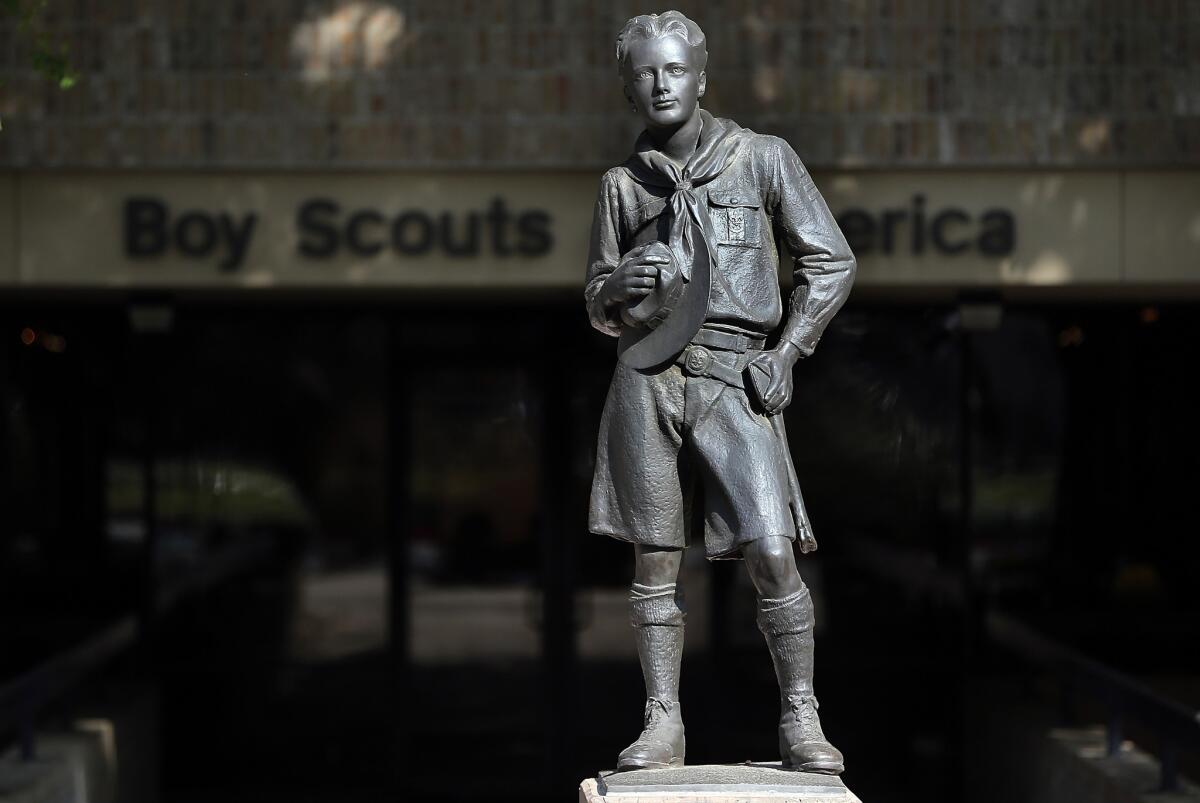Boy Scouts seek bankruptcy under wave of new sex abuse lawsuits

- Share via
The Boy Scouts of America, one of the nation’s oldest and largest youth organizations, filed for bankruptcy protection late Monday as former Scouts’ legal claims of past sexual abuse continue to mount.
The Scouts’ Chapter 11 petition, filed in Bankruptcy Court in Delaware, comes amid declining membership and a wave of new sex-abuse lawsuits after several states, including California, New York and New Jersey, recently expanded legal options for childhood victims to sue.
California’s law, AB 218, took effect in January and, among other provisions, opens a three-year “lookback window” for victims to sue for damages on claims previously barred by statutes of limitation. It also relaxes age restrictions on filing claims, giving victims until age 40 or five years after they become aware of injury caused by abuse.
The Boy Scouts of America “cares deeply about all victims of abuse and sincerely apologizes to anyone who was harmed during their time in Scouting. We are outraged that there have been times when individuals took advantage of our programs to harm innocent children,” Roger Mosby, the Scouts’ president and chief executive officer, said in a statement.
“While we know nothing can undo the tragic abuse that victims suffered, we believe the Chapter 11 process — with the proposed Trust structure — will provide equitable compensation to all victims while maintaining the BSA’s important mission,” he said.
Scouts officials will not say how many abuse lawsuits have been filed in recent years or how much has been paid out in settlements and judgments. Plaintiffs attorneys say the lawsuits number well into the hundreds and that many other claims were settled with confidential agreements before lawsuits were filed.
The bankruptcy petition for Boy Scouts of America, filed early Tuesday, Eastern Standard Time, lists assets of $1 billion to $10 billion and liabilities of $500 million to $1 billion. The Scouts statement noted that local Scouts councils are not part of the bankruptcy.
Some of the Scouts’ insurers have refused to cover payouts in sex abuse cases, contending that the 110-year-old organization could have prevented the abuse that led to the claims, court records show.
The Scouts’ bankruptcy is not likely to affect local Scouting activities but will halt ongoing lawsuits while settlements are negotiated. It also will require new abuse claims to be handled in that venue rather than in state courts.
Gilion Dumas, a Portland, Ore., attorney who has more than a dozen lawsuits pending against the Scouts in California, said the automatic stay on litigation will plunge her clients into legal limbo. Those who have filed lawsuits will join the ranks of other creditors, which could delay resolution of their claims for years, Dumas said.
One of her cases, involving a former Scout who allegedly was sexually abused when he was 9 and 10 years old, was scheduled for trial in March, she said.
“He was finally going to get his day in court, and that is going to be yanked away from him and he will be stuck in line with a lot of other people in bankruptcy court,” she said. “He will have to wait another two years to get any kind of compensation for his injuries.”
Looming liabilities
Although the national organization, which has a membership of 2.2 million Scouts, still has assets of $1.4 billion, the looming liabilities were large enough that officials had considered for about a year whether to file for bankruptcy protection.
As recently as last week, the Boy Scouts of America said “no decisions have been made” on bankruptcy and that it “does not comment on rumors or speculation.”
“The Boy Scouts of America is working with experts and exploring all options available so we can live up to our social and moral responsibility to equitably compensate victims who suffered abuse during their time in Scouting, while also ensuring that we carry out our mission to serve youth, families and local communities through our programs,” the organization said in a statement to The Times.
Besides lawsuits, the organization also has been buffeted by declining membership, including the departure of some 400,000 Scouts in troops sponsored by the Church of Jesus Christ of Latter-day Saints, which has cut ties to the program. Those numbers are not likely to be offset any time soon by the admission of girls, who have been eligible to join since February 2019.
The Chapter 11 action will allow the Boy Scouts of America to reorganize and restructure its finances. Lawyers for accusers say the move also is aimed at shielding billions more in real estate and other assets held separately by local Boy Scout councils from being tapped to settle abuse claims.
Some Catholic dioceses caught up in the church’s sex abuse scandal employed the same tactic, in part to protect parish assets against claims.
Many of the lawsuits followed the Los Angeles Times’ publication in 2012 of internal Scout records involving about 5,000 men on a blacklist known as the “perversion files,” a closely guarded trove of documents that details sexual abuse allegations against troop leaders and others dating back a century.
Attorney Paul Mones used about 1,200 of the files in a Portland courtroom to win a landmark $19.9-million verdict against the Scouts in 2010 on behalf of a man who was sexually abused as a boy in the 1980s.
“The biggest takeaway from that trial was that the public saw for the first time that the BSA had this vast knowledge base of sexual abuse that they sat on and did not educate the Scouts or their parents, and kept it from the public,” he said. “The importance of The Times’ release of those files was that people then had the ability to do a search online.”
In its yearlong examination of the files, The Times documented hundreds of cases in which the Boy Scouts failed to report accusations to authorities, hid the allegations from parents and the public or urged admitted abusers to quietly resign — and then helped cover their tracks with bogus reasons for their departures.
Accusers cited the files — formally known for decades as the “ineligible volunteer files” and now called the Volunteer Screening Database — as evidence the organization knew of pedophiles in its ranks but failed to protect children.
The sadness for [victims] is that the organization didn’t live up to the Boy Scout Oath. That will be the epitaph of this bankruptcy.
— Paul Mones, attorney for sexual abuse victims
Scouting officials have fought hard in court to keep the files from public view, contending that confidentiality was necessary to protect victims, witnesses and anyone falsely accused. It was not necessary to be charged with a crime to be placed in the files, nor were all allegations substantiated.
A researcher hired by the Scouts to analyze a more complete set of records from 1944 to 2016 said last year that she had identified 7,819 suspected abusers and 12,254 victims.
Plaintiffs’ lawyers and others contend those numbers understate the extent of the abuse in Scouting. They note that most offenders were accused of molesting multiple boys and that many instances of abuse were never reported. The Scouts also have acknowledged destroying an unknown number of files over the years.
During the last year, attorneys across the country have signed on hundreds of new clients who are expected to sue the Scouts.
Lawyers who launched a recent national TV ad campaign say they have taken on more than 1,600 new clients with sexual abuse claims against the Scouts, including hundreds of previously unidentified “hidden predators” whose names are not on the blacklist of alleged offenders.
In a previous statement to The Times, Scouts officials acknowledged there were “instances in our organization’s history when cases were not addressed or handled in a manner consistent with our commitment to protect Scouts.”
But they emphasized enhanced youth protection measures now in place, including criminal background checks for leaders and volunteers and mandatory reporting of incidents.
“We care deeply about all victims of abuse and sincerely apologize to anyone who was harmed during their time in Scouting,” the statement said. “We believe victims, we support them, we pay for counseling by a provider of their choice, and we encourage them to come forward.”
Mones said such statements ring hollow for many of his clients, who as children took to heart the Boy Scout oath “to help other people at all times; to keep myself physically strong, mentally awake, and morally straight.”
“The sadness for them is that the organization didn’t live up to the Boy Scout oath,” he said. “That will be the epitaph of this bankruptcy.”
More to Read
Sign up for Essential California
The most important California stories and recommendations in your inbox every morning.
You may occasionally receive promotional content from the Los Angeles Times.











